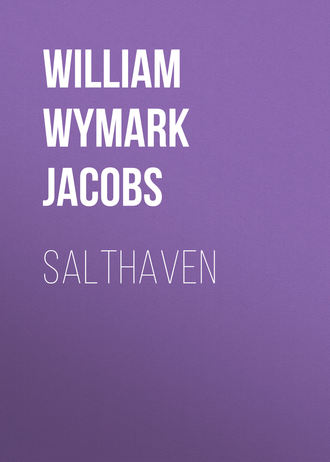 полная версия
полная версияSalthaven
She put on her hat and, running downstairs, opened the door and went out. At the gate she paused, and, glancing right and left, saw Robert Vyner approaching. He bowed and quickened his pace.
"Father is indoors," she said with a friendly smile, as she shook hands.
"It's a sin to be indoors an evening like this," said Robert, readily. "Are you going for a walk?"
"A little way; I am going to see a friend," said Joan. "Good-by."
"Good-by," said Mr. Vyner, and turned in at the gate, while Joan, a little surprised at his docility, proceeded on her way. She walked slowly, trying, in the interests of truth, to think of some acquaintance to call upon. Then she heard footsteps behind, gradually gaining upon her.
"I really think I'm the most forgetful man in Salt-haven," said Mr. Robert Vyner, in tones of grave annoyance, as he ranged alongside. "I came all this way to show your father a book on dahlias, and now I find I've left it at the office. What's a good thing for a bad memory?"
"Punish yourself by running all the way, I should think," replied Joan. "It might make you less forgetful next time."
Mr. Vyner became thoughtful, not to say grave. "I don't know so much about running," he said, slowly. "I've had an idea for some time past that my heart is a little bit affected."
Joan turned to him swiftly. "I'm so sorry," she faltered. "I had no idea; and the other night you were rolling the grass. Why didn't you speak of it before?"
Her anxiety was so genuine that Mr. Vyner had the grace to feel a little bit ashamed of himself.
"When I say that my heart is affected, I don't mean in the way of—of disease," he murmured.
"Is it weak?" inquired the girl.
Mr. Vyner shook his head.
"Well, what is the matter with it?"
Mr. Vyner sighed. "I don't know," he said, slowly. "It is not of long standing; I only noticed it a little while ago. The first time I had an attack I was sitting in my office—working. Let me see. I think it was the day you came in there to see your father. Yes, I am sure it was."
Miss Hartley walked on, looking straight before her.
"Since then," pursued Mr. Vyner, in the mournful tones suited to the subject, "it has got gradually worse. Sometimes it is in my mouth; sometimes—if I feel that I have offended anybody—it is in my boots."
Miss Hartley paid no heed.
"It is in my boots now," said the invalid, plaintively; "tight boots, too. Do you know what I was thinking just now when you looked at me in that alarmed, compassionate way?"
"Not alarmed," muttered Miss Hartley.
"I was thinking," pursued Mr. Vyner, in a rapt voice, "I was thinking what a fine nurse you would make. Talking of heart troubles put it in my mind, I suppose. Fancy being down for a month or two with a complaint that didn't hurt or take one's appetite away, and having you for a nurse!"
"I think that if you are going to talk nonsense—" began Joan, half stopping.
"I'm not," said the other, in alarm, "I've quite finished; I have, indeed."
He stole a glance at the prim young, figure by his side, and his voice again developed a plaintive note. "If you only knew what it was like," he continued, "to be mewed up in an office all day, with not a soul to speak to, and the sun shining, perhaps you'd make allowances."
"I saw you down by the harbour this morning," said the girl.
"Harbour?" said the other, pretending to reflect—"this morning?"
Joan nodded. "Yes; you were lounging about—in the sunshine—smoking a cigarette. Then you went on to the Indian Chief and stood talking for, oh, quite a long time to Captain Trimblett. Then—"
"Yes?" breathed Mr. Vyner, as she paused in sudden confusion. "What did I do next?"
Miss Hartley shook her head. "I only saw you for a moment," she said.
Mr. Vyner did not press the matter; he talked instead on other subjects, but there was a tenderness in his voice for which Miss Hartley told herself her own thoughtlessness was largely responsible. She trembled and walked a little faster. Then, with a sense of relief, she saw Captain Trimblett approaching them. His head was bent in thought, and his usual smile was missing as he looked up and saw them.
"I wanted to see you," he said to Joan. "I'm off to London to-morrow."
"To-morrow!" repeated the girl, in surprise.
"Twelve-thirty train," said the captain, looking shrewdly from one to the other. "I'm just off home; there are one or two matters I must attend to before I go, and I wanted to talk to you."
"I will come with you," said Joan, quickly. "I haven't seen Mrs. Chinnery for a long time." She nodded to Mr. Vyner and held out her hand. "Good-by."
"Good-by," said that gentleman. He shook hands reluctantly, and his amiable features took on a new expression as he glanced at the captain.
"Try and cheer him up," he said, with an air of false concern. "It's only for a little while, cap'n; you'll soon be back and—you know the old adage?"
"Yes," said the captain, guardedly.
"Although, of course, there are several," said Mr. Vyner, thoughtfully. "I wonder whether we were thinking of the same one?"
"I dare say," said the other, hastily.
"I was thinking of 'Absence makes the heart grow fonder'—of the Indian Chief" said the ingenuous Robert. "Was that the one you were thinking of?"
The captain's reply was inaudible as he turned and bore off Miss Hartley. The young man stood for some time watching them, and, as Joan and her burly companion disappeared round the corner, shook his head and set off home.
"He'll sober down as he gets older," said the captain, after they had proceeded some way in silence. "I'm glad I met you. Your father told me you were going to London, and I was thinking we might go up together. It's odd we should both be going. Quite a coincidence."
"In more ways than one," said Joan. "Father told me you had arranged it together. I quite know why I am going."
The captain coughed.
"I know why you are going, too," said Joan.
The captain coughed again, and muttered something about "children" and "business."
"And if I'm going to-morrow I had better get back and pack," continued the girl.
"Plenty of time in the morning," said the captain. "It'll make the time pass. It's a mistake to stow your things away too soon—a great mistake."
"I would sooner do it, though," said Joan, pausing. 170
"You come along to Tranquil Vale," said Captain Trimblett, with forced joviality. "Never mind about your packing. Stay to supper, and I'll see you home afterward."
Miss Hartley eyed him thoughtfully.
"Why?" she inquired.
"Pleasure of your company," said the captain.
"Why?" said Miss Hartley again.
The captain eyed her thoughtfully in his turn.
"I—I haven't told 'em I'm going yet," he said, slowly. "It'll be a little surprise to them, perhaps. Miss Willett will be there. She's a silly thing. She and Peter might make a duet about it If you are there–"
"I'll take care of you," said Joan, with a benevolent smile. "You'll be safe with me. What a pity you didn't bring your little troubles to me at first!"
The captain turned a lurid eye upon her, and then, realizing that silence was more dignified and certainly safer than speech, said nothing. He walked on with head erect and turned a deaf ear to the faint sounds which Miss Hartley was endeavouring to convert into coughs.
Mrs. Chinnery, who was sitting alone in the front room, rose and greeted her with some warmth as she entered, and, the usual reproachful question put and answered as to the length of time since her last visit, took her hat from her and went upstairs with it. An arch smile from Miss Hartley during her absence was met by the ungrateful captain with a stony stare.
"I came to bid you good-by," said Joan, as Mrs. Chinnery returned. "I am off to London to-morrow."
"London!" said Mrs. Chinnery.
"I am going to stay with an uncle," replied Joan.
"Quite a coincidence, isn't it?" said the captain, averting his gaze from the smiling face of Miss Hartley, and trying to keep his voice level.
"Coincidence!" said Mrs. Chinnery, staring at him.
"I've got to go, too," said the captain, with what he fondly imagined was a casual smile. "Got to run up and see my boys and girls. Just a flying visit there and back. So we are going together."
"You!" said the astonished Mrs. Chinnery. "Why didn't you tell me? Why, I've got nothing ready. Serves me right for putting things off."
The captain began to murmur something about an urgent letter, but Mrs. Chinnery, who had opened the cupboard and brought out a work-basket containing several pairs of the thick woollen socks that formed the captain's usual wear, was almost too busy to listen. She threaded a needle, and, drawing a sock over her left hand, set to work on a gaping wound that most women would have regarded as mortal.
Mr. Truefitt and Mrs. Willett entered from the garden just as the Captain was explaining for the third time.
"Children are not ill, I hope," said Mr. Truefitt with ill concealed anxiety.
"No," said the Captain.
Mrs. Willett had seated herself by the side of Mrs. Chinnery, ventured to pat that lady's busy hand.
"He will soon be back," she murmured.
"He will look after that," said Mr. Truefitt, with a boisterous laugh. "Won't you, cap'n?"
Miss Willett sat regarding Captain Trimblett with a pensive air. She was beginning to regard his diffidence and shyness as something abnormal. Hints of the most helpful nature only seemed to add to his discomfort, and she began to doubt whether he would ever muster up sufficient resolution to put an end to a situation that was fast becoming embarrassing to all concerned.
"Of course," she said, suddenly, "it is only right that you should run up and see your children first. I hadn't thought of that."
"First?" repeated the captain, his face flooding with colour as he realized the inward meaning of the remark. "What do you mean by first?"
His voice was so loud that Miss Willett sat up with a start and looked round nervously.
"Miss Willett means before you sail," said Joan, gently, before that lady could speak. "How pleased they will be to see you!"
"Aye, aye," said the captain, regaining his composure by an effort.
"What a lot of things he will have to tell them!" murmured the persevering Miss Willett. "Have you ever seen them?" she inquired, turning to Mrs. Chinnery.
"No," was the reply.
"How strange!" said Miss Willett, with a reproachful glance at the captain. "I expect you'll like them very much when you do."
"Sure to," chimed in Mr. Truefitt. "Susanna was always partial to children."
"I'm sure she is," said Miss Willett, regarding the industrious Mrs. Chinnery affectionately. "How fortunate!"
She rose as she spoke, and, screwing her face up at Joan with great significance, asked her whether she wouldn't care to see the garden.
"Very much," said Joan. "Come along," she added, turning to the captain. "Now come and show me that rose-bush you have been talking about so much."
Captain Trimblett rose with an alacrity that mystified Miss Willett more than ever, and, having gained the garden, found so many things to show Miss Hartley, and so much to talk about, that supper was on the table before he had finished. Fearful of being left alone with Miss Willett, he stuck to his young protector so closely that in going in at the door he trod on her heel. Miss Hartley entered the room limping, and, having gained her seat, sat eying him with an expression in which pain and reproachful mirth struggled for the mastery.
"What a delightful evening!" she said, in an affected voice, as the captain walked home with her about an hour later; "I have enjoyed myself tremendously."
The captain uttered an impatient exclamation.
"It reminded me of the old fable of the lion and the mouse," continued Joan.
The captain grunted again, and, in a voice that he vainly endeavoured to render polite, said that he did not know what she was talking about.
CHAPTER XV
MR. ROBERT VYNER received the news of Miss Hartley's sudden departure with an air of polite interest. The secrecy of the affair and the fact that she had gone with Captain Trimblett convinced him that it was no casual visit, and he mused bitterly on the strange tendency of seafaring people to meddle with the affairs of others. An attempt to ascertain from Hartley the probable duration of her visit, and other interesting particulars, as they sat together in the young man's office, yielded no satisfaction.
"She made up her mind to go rather suddenly, didn't she?" he inquired.
Hartley said "Yes," and murmured something about taking advantage of the opportunity of going up with Captain Trimblett. "She is very fond of the captain," he added.
"Is she staying near him?" asked Vyner, without looking up from his work.
The chief clerk, who was anxious to get away, said "No," and eyed him uneasily.
"I hope that London will agree with her," continued Robert, politely. "Is she staying in a healthy part?"
"Very," said the other.
Mr. Vyner bent over his work again, and scowled diabolically at an innocent letter which said that his instructions should have immediate attention. "Which do you consider a healthy part?" he said presently.
Mr. Hartley, after some reflection, said there were many districts which merited that description. He mentioned eleven, and was discoursing somewhat learnedly on drainage and soils when he noticed that the young man's attention was wandering. With a muttered reference to his work, he rose and quitted the room.
Day succeeded day in tiresome waiting, and Mr. Robert Vyner, leaning back in his chair, regarded with a hostile eye the pile of work that accumulated on his table as he sat dreaming of Joan Hartley. In a species of waking nightmare he would see her beset by hordes of respectful but persistent admirers. He manifested a craving for Mr. Hartley's society, and, discovering by actual experience that, melancholy as the house was without its mistress, all other places were more melancholy still, contrived, to its owner's great discomfort, to spend a considerable number of his evenings there.
"He's a pattern to all of you," said Rosa to Mr. Walters, who sat in the kitchen one evening, cautiously watching Mr. Vyner through a small hole in the muslin blind.
Mr. Walters grunted.
"I believe he worships the ground she treads on," said Rosa, in exalted tones.
Mr. Walters grunted again, and her colour rose. For nearly a fortnight she had not spoken to any other man—at least, to the boatswain's knowledge—and she fully realized the cloying effect of security upon a man of his temperament.
"Last night I saw him standing for half an hour looking into a shop," she said, softly. "What shop do you think it was?"
Mr. Walters's face took on an obstinate expression. "Butcher's?" he hazarded, at last.
"Butcher's!" repeated Rosa, with scorn. "What should he want to look in a butcher's for? It was Hickman's, the jeweller's."
The boatswain said "Oh!" and devoted himself with renewed interest to his task of watching Mr. Vyner. Miss Jelks's conversation for some time past had circled round engagement-rings, a subject which brought him face to face with the disagreeable side of flirtation.
"More fool him," he said, without looking round.
Rosa gazed fixedly at the back of his head. She was far too sensible not to have noticed the gradual waning of his passion, and she chided herself severely for having dropped her usual tactics. At the same time she realized that she was not alone to blame in the matter, the gilded youth of Salthaven, after one or two encounters with Mr. Walters, having come to the conclusion that a flirtation with her was a temptation to be avoided.
"Most men are fools," she said, calmly. "A young fellow I met the other evening—the night you couldn't come out—went on like a madman just because I wouldn't promise to meet him again."
"Pity I didn't see 'im," said Mr. Walters, grimly.
"Oh!" said Rosa, losing her head. "Why?"
"I'd ha' give 'im something to make a fuss about," said the boatswain, "that's all."
"It's not his fault," said Rosa, softly. "He couldn't help himself. He told me so. Quite the gentleman—quite. You ought to see the way he raises his hat. And his head is covered all over with little short curls."
"Like a nigger," said Mr. Walters, with disappointing calmness.
He removed his eye from the window and, taking out his pipe, began to fill it from a small metal box. Rosa, compressing her lips, watched him with a sardonic smile.
"Got anything to do this evening?" she inquired.
"No," said the other.
"Well, I have," said Rosa, with a bright smile, "so I'll say good-evening."
Mr. Walters rose and, replacing a box of matches in his pocket, stood watching her with his mouth open.
"Don't hurry," she said, at last.
The boatswain sat down again.
"I mean when you get outside," explained the girl.
Mr. Walters gazed at her in slow perplexity, and then, breathing heavily, walked out of the kitchen like a man in a dream. His suspicions were aroused, and with an idea that a little blood-letting would give him relief, he wasted the entire evening lying in wait for a good-looking, gentlemanly young man with curly hair.
Miss Jelks waited for his appearance the following evening in vain. Several evenings passed, but no boatswain, and it became apparent at last that he had realized the perils of his position. Anger at his defection was mingled with admiration for his strength of mind every time she looked in the glass.
She forged her weapons slowly. A new hat was ready, but a skirt and coat still languished at the dressmaker's. She waited until they came home, and then, dressing her hair in a style which owed something to a fashion-paper and something to her lack of skill, sallied out to put matters on a more satisfactory footing.
It was early evening, and the street fairly full, but for some time she wandered about aimlessly. Twice she smiled at young men of her acquaintance, and they smiled back and went on their way. The third she met with a smile so inviting that against his better sense he stopped, and after a nervous glance round made a remark about the weather.
"Beautiful," said Rosa. "Have you been ill, Mr. Filer?"
"Ill?" said the young man, staring. "No. Why?"
"Haven't seen you for such a long time," said Miss Jelks, swinging her parasol. "I've been wondering what had become of you. I was afraid you were ill."
Mr. Filer caressed his moustache. "I haven't seen you about," he retorted.
"I haven't been out lately," said the girl; "it's so lonely walking about by yourself that I'd sooner sit indoors and mope."
Mr. Filer stood blinking thoughtfully. "I s'pose you're going to meet a friend?" he said, at last.
"No," said Rosa. "I s'pose you are?"
Mr. Filer said "No" in his turn.
Two minutes later, in a state of mind pretty evenly divided between trepidation and joy, he found himself walking by her side.
They chose at first the quietest streets, but under Miss Jelks's guidance drifted slowly back to the town.
To her annoyance the boatswain was nowhere to be seen, and the idea of wasting the evening in the society of Mr. Filer annoyed her beyond measure. She became moody, and vague in her replies to his sallies, seated herself on a pile of timber, and motioned the young man to join her and finally, with the forlorn hope that Mr. Walters might be spending the evening aboard ship, strolled on to the quay.
Work was over and they had the place to themselves.
She seated herself on a pile of timber and, motioning the young man to join her, experienced a sudden thrill as she saw the head of Mr. Walters protruding tortoise-like over the side of the Indian Chief, which lay a little way below them. Fearful that Mr. Filer should see it, she directed his attention to two small boys who were disporting themselves in a ship's boat, and, with her head almost on his shoulder, blotted out the steamer with three feathers and a bunch of roses.
It was a beautiful evening, but Mr. Filer failed to understand why she should slap his hand when he said so. He could hardly open his mouth without being requested to behave himself and getting another tiny slap. Greatly encouraged by this treatment he ventured to pass his left arm round her waist, and, in full view of the choking boatswain, imprison both her hands in his.
Miss Jelks endured it for two minutes, and then, breaking away, gave him a playful little prod with her parasol and fled behind a warehouse uttering faint shrieks. Mr. Filer gave chase at once, in happy ignorance that his rival had nearly fallen overboard in a hopeless attempt to see round the corner. Flesh and blood could stand it no longer, and when the couple emerged and began to walk in a more sober fashion toward the town an infuriated boatswain followed a little in the rear.
Mr. Filer saw him first and, with a sudden sinking at his heart, dropped his light banter and began to discourse on more serious subjects. He attempted to widen the distance between them, but in vain. A second glance showed him Mr. Walters close behind, with a face like that of two destroying angels rolled into one. Trembling with fright he quickened his pace and looked round eagerly for means of escape. His glance fell on a confectioner's window, and muttering the word "Ice" he dashed in, followed in a more leisurely fashion by Miss Jelks.
"I was just feeling like an ice," she said, as she took a seat at a little marble-topped table. She put her hat straight in a mirror opposite, and removing her gloves prepared for action.
Mr. Filer ate his ice mechanically, quite unaware of its flavour; then as nothing happened he plucked up courage and began to talk. His voice shook a little at first, but was gradually getting stronger, when he broke off suddenly with his spoon in mid-air and gazed in fascinated horror at a disc of greenish-yellow nose that pressed against the shop-window. The eyes behind it looked as though they might melt the glass.
He put his spoon down on the table and tried to think. Miss Jelks finished her ice and sat smiling at him.
"Could you—could you eat another?" he faltered.
Miss Jelks said that she could try, and remarked, casually, that she had once eaten thirteen, and had shared the usual superstition concerning that number ever since.
"Aren't you going to have one, too?" she inquired, when the fresh ice arrived.
Mr. Filer shook his head, and, trying hard to ignore the face at the window, said that he was not hungry. He sat trembling with agitation, and, desirous of postponing the encounter with the boatswain as long as possible, kept ordering ices for Miss Jelks until that lady, in justice to herself, declined to eat any more.
"I can't finish this," she said. "You'll have to help me."
She took up a generous spoonful, and in full view of the face at the window leaned across the table and put it into Mr. Filer's unwilling mouth. With a violent shudder he saw the boatswain leave the window and take up a position in front of the door. Miss Jelks drew on her gloves and, with another glance in the mirror as she rose, turned to leave. Mr. Filer made no attempt to follow.
"Ain't you ready?" said Miss Jelks, pausing.
"I'm not feeling very well," said the young man, desperately, as he passed his hand across his forehead. "It's the ice, I think—I'm not used to 'em."
"Perhaps the air will do you good," said Rosa.
Mr. Filer shook his head. Whatever good the air might do him would, he felt certain, be counteracted by the treatment of the boatswain.
"Don't wait for me," he said, with a faint sad smile. "I might be here for hours; I've been like it before."
"I can't leave you like this," said Rosa. "Why"—she turned suddenly, and her face lit up with a smile—"here's Mr. Walters! How fortunate! He'll be able to help you home."
"No—don't trouble," gasped Mr. Filer, as the boatswain came into the shop and prepared to render first aid by moistening his palms and rubbing them together. "It's very kind of you, but I shall be all right if I'm left alone. I'd rather be left alone—I would indeed."
"You'd better let the gentleman help you home," urged the shopkeeper. "He looks strong."
Mr. Filer shuddered.









